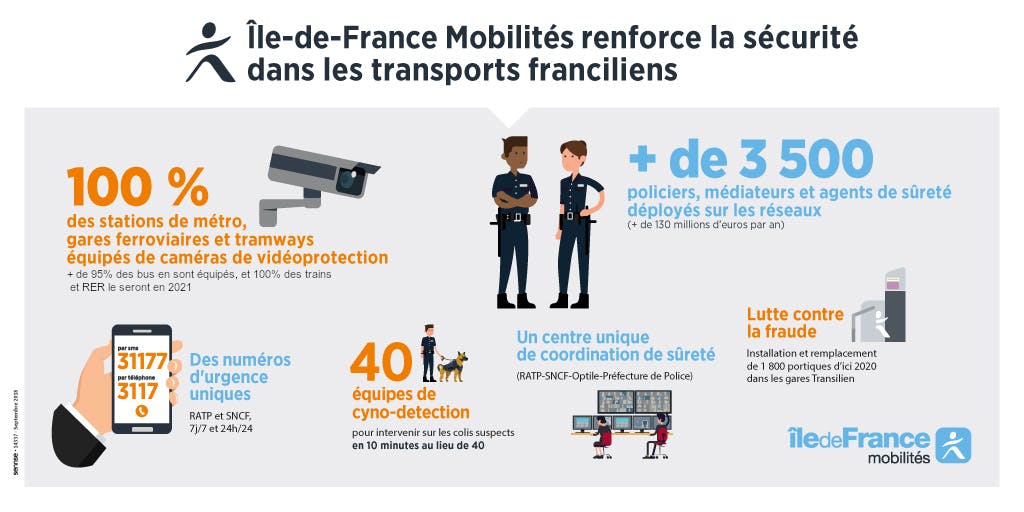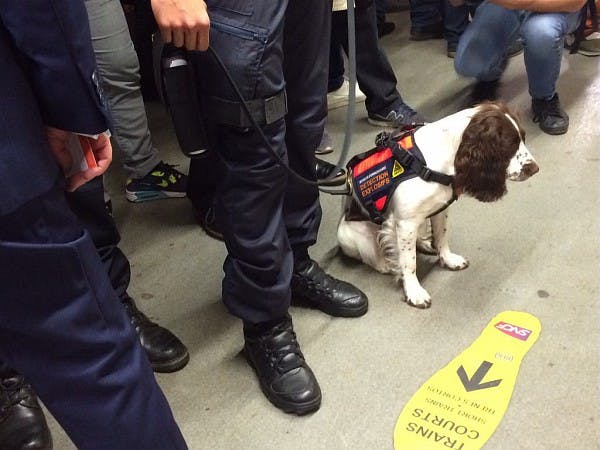Reinforced measures for + safety in transport

Infographic: Safety measures in Île-de-France transport in Île-de-France. 100% of metro stations, train stations and trams equipped with CCTV cameras. More than 3500 police officers, mediators and security agents deployed on the networks. Unique emergency numbers, 31177 by SMS, 3117 by phone RATP and SNCF, 40 dog detection teams. A single security coordination centre. Fight against fraud. Île-de-France Mobilités.
40 brigades of dog handlers deployed on the network for better management of suspicious packages
Since 2014, the number of forgotten bags and objects has increased by 122% on the Transilien network with more than 1500 reports per year, or more than 4 per day, and nearly 7 cases reported per day on the RATP network. These situations, which are becoming more and more frequent, cause many delays and disruptions and reinforce a feeling of insecurity.
Since July 2018, a total of 40 dog detection teams, composed of a dog handler associated with a dog specially trained to detect explosives, have been operational on the transport networks operated by the SNCF and RATP to respond to any report of a suspicious object forgotten in a station, a metro train, etc.
Île-de-France Mobilités is working with operators to strengthen human resources and guarantee greater safety in transport in the Ile-de-France region, while maintaining a constant effort to improve traffic regularity. This system is composed of:
– 20 brigades on the RATP network (300 stations and 30 stations), 100% financed by Île-de-France Mobilités, i.e. €3.8 million until 2020
– 20 brigades on the SNCF network, co-financed over 3 years (2017-2019) by Île-de-France Mobilités (€4 million) and SNCF (€2 million)
Up to 55 minutes saved for travellers, safely
This system should make it possible to carry out a "search for clues" in 5 to 15 minutes, compared to more than an hour in the absence of such teams, which makes it possible to increase the efficiency of the teams of the SUGE (General Surveillance) of the SNCF and the GPSR (Network Protection and Security Group) of the RATP and therefore to fight more effectively against possible malicious acts.
An RER line disrupted at rush hour by a suspicious package takes 2 to 3 hours to return to normal traffic. The faster intervention of the canine detection crew promises a shallower disruption of the line's traffic and a faster return to normal.

Concrete means to fight against harassment and incivility
The human presence has been greatly reinforced since 2016 with the recruitment of 785 reception, security and mediation agents in stations and on public transport networks throughout the Region, thus helping to reassure passengers and ensure their safety.
On the RATP network, more than 5,300 agents are present in the network's stations and stations, who can be mobilized directly to alert the Network Protection and Security Group (GPSR), made up of 1,000 agents, including a hundred teams deployed on the network every day. The RATP security department also deploys plainclothes security teams whose missions include the fight against violence against women.
On the SNCF network, in Île-de-France, 5,000 agents are present at stations and on trains. 740 security agents (SUGE) also criss-cross the Île-de-France, and 172 mediators work on the lines to fight against incivility.
Additional human resources for the RATP and the SNCF
As part of its contracts signed in 2016 with RATP and SNCF, the number of staff in the field will be increased by 490 people: 290 agents for the SNCF (SUGE, mediators and sales agents) and 200 agents for the RATP (GPSR and mobile bus escort teams after midnight).
In addition, 40 dog detection brigades were deployed in 2017 (20 SNCF) and 2018 (20 RATP as of 1 June). They are participating in the overall increase in the security services and freeing some of them from checking baggage forgotten in the trains to devote themselves to their other missions. These teams make it possible to reduce response times following alerts to abandoned packages, so the "removal of doubt" can be done in about fifteen minutes instead of an hour. On the SNCF network, there has been a 122% increase in forgotten bags, i.e. more than 150 interventions per year since 2014.
Staff trained to care for victims of harassment
Since 2016, all RATP agents in contact with passengers have received training dedicated to the care of victims of harassment as part of their initial training. This specific module was developed in partnership with Miprof (Interministerial Mission for the Protection of Women against Violence and the Fight against Human Trafficking). During this training, RATP agents are trained in the reception and care of victims of violence and sexual harassment, in knowledge of the legal framework and the means of combating and alerting available in public transport.
In 2017, SNCF Transilien began training its SUGE employees with a specific module on sexual harassment in its premises. A training course developed with the Miprof in order to be as close as possible to the victims' experiences. The 740 security guards learned from professionals how to spot deviant behaviour during their rounds, they learned to take charge, listen, recognise the status of victim and refer them to the police. In 2018, station agents benefited from this same training.
A reinforced human presence on the bus networks of Grande-Couronne
Île-de-France Mobilités also finances around 520 mediation agents for 70 networks, including 520 additional since 2016. These mediators provide a reassuring presence, their work is appreciated by both operators and passengers. However, they are not trained or equipped to carry out deterrent patrols (islanding) or to accompany controllers, as these situations can be a source of conflict. Unlike the RATP and the SNCF, the bus companies in Grande-Couronne did not have staff dedicated to these tasks.
Île-de-France Mobilités has therefore decided to grant more resources to operators to strengthen safety in the buses of Grande-Couronne, with 200 agents specifically dedicated to security (currently being recruited), for an estimated budget of 10 million euros over four years. The first of them took up their duties at the start of the 2017 school year. They will be able to carry out deterrent rounds and intervene in the event of incivility.
Around €130 million is paid each year by Île-de-France Mobilités to operators to ensure a human presence: SUGE, GPSR, SNCF mediators, Optile and RATP night buses.
Widespread video protection in all transport
Île-de-France Mobilités also finances the development of video protection on the entire Île-de-France network:
- 100% of RATP buses on the Paris and Petite Couronne network are already equipped with cameras and soon 100% of the Grande Couronne buses;
- 100% of metro stations and train stations are video-protected;
- 100% of trains and RER trains will be video-protected by the end of 2021 (including the 700 new or renovated trains ordered by 2021).
A single emergency number, 31 17
From now on, any passenger on the SNCF or RATP network in the Paris region, who witnesses or is the victim of an attack, an abnormal situation or who notices a person in danger, can contact a single emergency number, 31 17, by phone. For more discretion, it is also possible to send a text message to 31 17 7 or to report the incident via the "Alerte 31 17" application or on Vianavigo. This service, designed by the SNCF, is available 7 days a week and 24 hours a day.
When calling out to a call or text message, the 31 17 operator identifies the sender, takes into account its nature and locates its origin. Security agents were then immediately sent to the scene to intervene.
Explore more Transportation Safety News Releases and Press Kits: